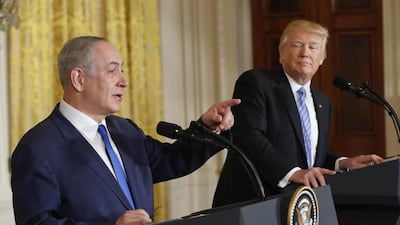New York // Donald Trump publicly ended decades of US foreign policy on Wednesday by dropping Washington’s commitment to the two-state solution in the Middle East ahead of his first White House meeting with Israeli premier Benjamin Netanyahu.
The mood was warm between the two leaders as they stood side by side during a news conference to underline the mutual understanding between their two countries.
Mr Trump said Israel must make compromises and said settlement building would not help the search for peace but his reversal on a two-state solution will send shock waves through the Palestinian territories and around the world.
“I’m looking at two-state and the one state and I like the one that both parties like,” he said. “I’m very happy with the one that both parties like. I can live with either one.”
The two-state solution — with Israel and a sovereign Palestine existing side by side — has been the starting point for any peace talks for decades.
However, stalled negotiations and Israeli settlement building have led even some Palestinian leaders to doubt that two states remained viable.
Antonio Guterres, the United Nations secretary general, said the world remained agreed on the way forward and that everything possible should be done to keep the two-state solution alive.
“There is no plan B other than a two-state solution,” he said in Cairo.
For his part, Mr Netanyahu avoided addressing the question directly but said he wanted to focus on “substance” not “labels”.
The Israeli prime minister said shared opposition to Iran and to ISIL had brought a “historic opportunity” for an alliance with Arab states and a chance to advance security and find peace in the region. The approach — known as “outside-in” — involves building agreements with Gulf states, who would then encourage Palestinians to buy into a new peace deal.
“Let us see new avenues of peace and bring the remarkable alliance between Israel and the United States to even greater heights,” he said.
Mr Netanyahu once again outlined his two criteria for finding peace: “It’s the recognition of the Jewish state and it’s Israel’s security control of the entire area, otherwise we are just fantasising, otherwise we’ll just get another failed state, another terrorist state, an Islamist dictatorship that will not work for peace.”
Before the news conference, Palestinian leaders reacted with alarm to White House briefings that Mr Trump would not refer to the two-state solution during the talks.
Hanan Ashrawi, a senior member of the Palestine Liberation Order, accused Mr Trump of dealing in “alternative realities”.
“If the Trump Administration rejects this policy it would be destroying the chances for peace and undermining American interests, standing and credibility abroad,” she said. “Accommodating the most extreme and irresponsible elements in Israel and in the White House is no way to make responsible foreign policy.”
Hours earlier it emerged that Mike Pompeo, the CIA chief, held secret talks with Palestinian president Mahmoud Abbas in the West Bank, according to Maan, the Palestinian news agency.
Palestinian officials said the meeting took place on Tuesday at Mr Abbas’ headquarters in Ramallah, in a move that will be seen as an attempt to placate anxiety about Mr Trump’s close relationship with the Israeli leader.
Mr Netanyahu has spent 11 years in power during two stints but has never overlapped with a Republican president. After eight frosty years of Barack Obama, his personal links to the new administration — Mr Trump’s senior adviser and son-in-law Jared Kushner is a family friend — mark a chance to reframe a crucial relationship.
Mr Trump’s campaign promise to move the US embassy to Jerusalem, thus recognising the city’s status as capital of Israel, and several public pronouncements of friendship suggested a budding bromance between the two leaders.
Since taking power the new American president has prevaricated on the issue of relocating the embassy and suggested settlement building was not helpful to finding peace. Rather than a cooling of relations, some analysts believe the moves will help the Israeli prime minister maintain the status quo as he contends with a domestic political crisis.
During the news conference Mr Trump once again said he wanted to relocate the embassy but offered no timeline or concrete commitment.
Mr Netanyahu publicly signed up to the two-state solution in 2009 under pressure from Mr Obama. Since then he has avoided further endorsements as he battles hardliners within his own coalition.
In the meantime, settlement building has continued apace. Some 350,000 Israelis in a patchwork of settlements across the West Bank and a quarter of a million in East Jerusalem make a two-state solution more difficult to deliver with every passing year.
Either way, both Israel and the US have a huge interest in a successful first meeting between their leaders, said Dennis Ross, who served as a Middle East coordinator under President Bill Clinton.
“It’s going to succeed in no small part because both President Trump and prime minister Netanyahu have a very big stake in wanting to demonstrate that whatever the problems were with the last administration, they are now gone,” he said. “And that in no small part they were attributable to the last administration, meaning to President Obama.”
*With Associated Press, Agence France-Presse and Reuters

